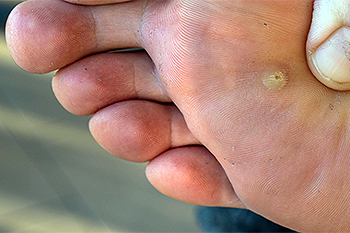6650 Frankford Ave
Philadelphia, PA 19135
 Plantar warts develop on the bottom of the feet. They grow into the skin as a result of pressure that is exerted while walking or running. They can cause severe pain and discomfort, and it can be difficult to complete daily activities. Plantar warts are associated with the human papillomavirus (HPV) and live in warm and moist areas. These can include shower room floors, public pools, and locker rooms. The virus can enter the body through small cracks in the skin and wearing appropriate shoes while in these environments can help to reduce exposure. The wart appears to be a thickened area of hard skin, and they often have small black dots in the center. There are several treatment methods available, and it is strongly advised that you consult with a podiatrist if you are afflicted with plantar warts.
Plantar warts develop on the bottom of the feet. They grow into the skin as a result of pressure that is exerted while walking or running. They can cause severe pain and discomfort, and it can be difficult to complete daily activities. Plantar warts are associated with the human papillomavirus (HPV) and live in warm and moist areas. These can include shower room floors, public pools, and locker rooms. The virus can enter the body through small cracks in the skin and wearing appropriate shoes while in these environments can help to reduce exposure. The wart appears to be a thickened area of hard skin, and they often have small black dots in the center. There are several treatment methods available, and it is strongly advised that you consult with a podiatrist if you are afflicted with plantar warts.
Plantar warts can be very uncomfortable. If you need your feet checked, contact John M. Fanelly, DPM from Northeast Philadelphia. Our doctor will assist you with all of your foot and ankle needs.
About Plantar Warts
Plantar warts are the result of HPV, or human papillomavirus, getting into open wounds on the feet. They are mostly found on the heels or balls of the feet.
While plantar warts are generally harmless, those experiencing excessive pain or those suffering from diabetes or a compromised immune system require immediate medical care. Plantar warts are easily diagnosed, usually through scraping off a bit of rough skin or by getting a biopsy.
Symptoms
Treatment
To help prevent developing plantar warts, avoid walking barefoot over abrasive surfaces that can cause cuts or wounds for HPV to get into. Avoiding direct contact with other warts, as well as not picking or rubbing existing warts, can help prevent the further spread of plantar warts. However, if you think you have developed plantar warts, speak to your podiatrist. He or she can diagnose the warts on your feet and recommend the appropriate treatment options.
If you have any questions please feel free to contact our office located in Philadelphia, PA . We offer the newest diagnostic and treatment technologies for all your foot and ankle needs.